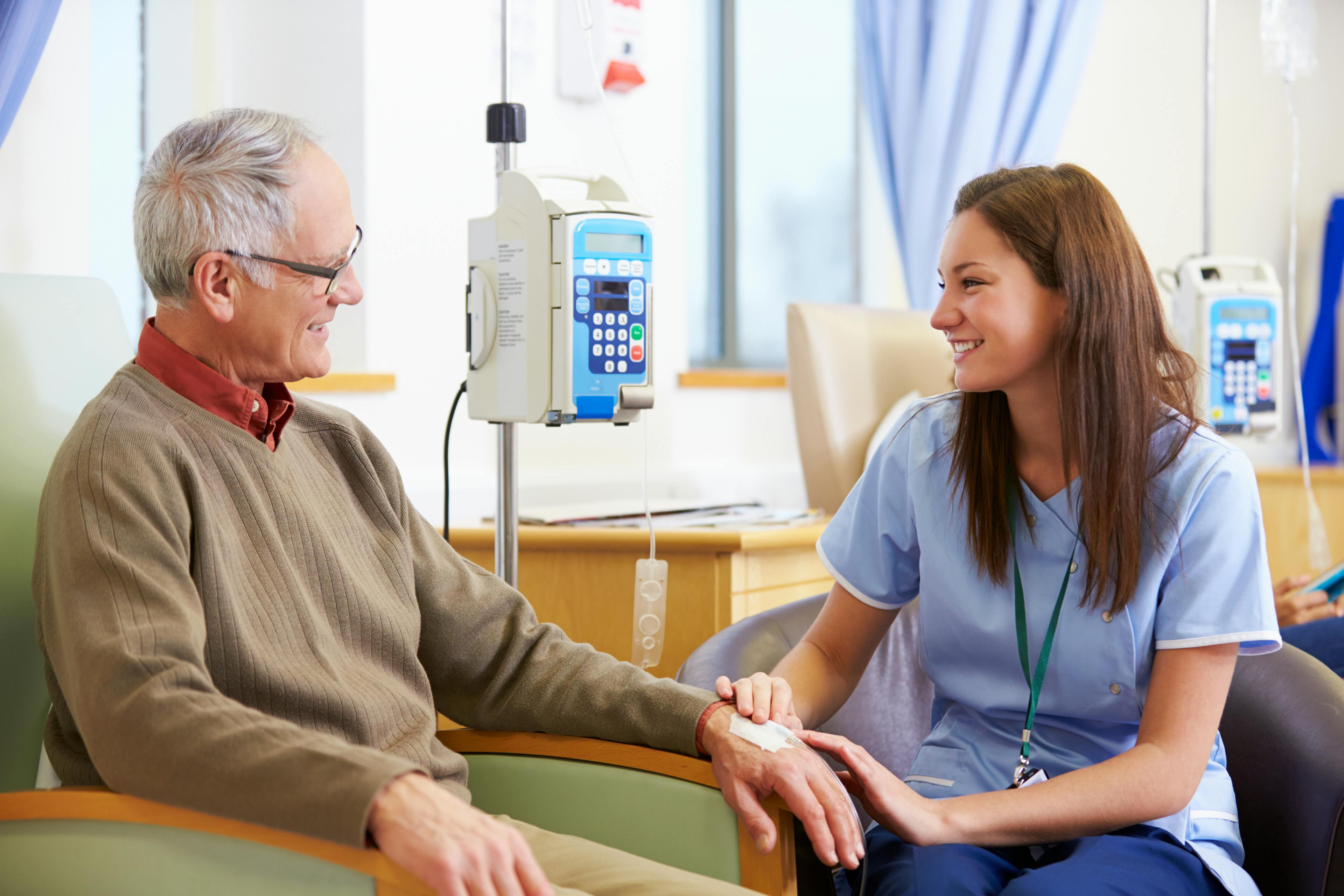Oncology

Cancer Care Specialists
We understand how cancer affects your health, daily routines, and vision for the future. At CLS Health, you'll find the medical expertise and compassionate support to help you navigate this unexpected journey with confidence, clarity, and dignity.
Our team specializes in diagnosing and treating all common cancers. We offer screenings and personalized treatment plans using the most effective approaches in modern oncology to address your specific condition.
Treatment will vary based on cancer type and may include:
- Surgery
- Radiation therapy
- Chemotherapy
- Advanced modalities like hormonal therapy and immunotherapy
Seamless, Coordinated Care
From your initial consultation through treatment and beyond, CLS Health's oncology and hematology specialists work as a team to deliver coordinated services that address all aspects of your condition. Our interdisciplinary approach is designed to streamline your care, reduce stress, and lead to better outcomes.
What are the warning signs of cancer?
Common warning signs of cancer include:
- Unexplained weight loss
- Persistent fatigue
- Lumps or swelling
- Changes in the skin or moles
- Chronic pain
- Difficulty swallowing
- Unusual bleeding
Providers

Medical Oncology

Leonor Hines
Family Medicine
Oncology & Hematology Services
Conditions Treated
Our oncology team specializes in treating some of the most frequently diagnosed cancers, including:
- Colorectal Cancer
- Kidney Cancer
- Liver Cancer
- Lung Cancer
- Skin Cancer
- Stomach Cancer
We provide expert care for cancers affecting reproductive organs and other gender-related conditions:
Men’s Cancers
- Prostate Cancer
- Testicular Cancer
Women’s Cancers
- Breast Cancer
- Cervical Cancer
- Endometrial Cancer
- Ovarian Cancer
- Hemophilia – A genetic disorder affecting blood clotting.
- Anemia – A condition characterized by a lack of healthy red blood cells.
- Thrombosis – The formation of harmful blood clots in veins or arteries.
- Comprehensive Cancer Screenings – Gender-specific screenings for men and women.
- Breast Cancer Screening – Mammograms & mobile mammography services.
- Cervical Cancer Screening – Pap tests and HPV testing.
- Colorectal Cancer Screening – Colonoscopies and stool-based tests.
- Endometrial Cancer Screening – Diagnostic imaging and biopsies.
- Liver Cancer Screening – Ultrasound, CT scans, and blood tests.
- Lung Cancer Screening – Low-dose CT scans for high-risk individuals.
- Ovarian Cancer Screening – Pelvic exams, ultrasounds, and blood tests.
- Prostate Cancer Screening – PSA blood tests and digital rectal exams.
- Skin Cancer Screening – Full-body skin exams by specialists.
Treatments
- Precision Cancer Medicines – Targeted therapies based on genetic testing.
- Surgery – Tumor removal and minimally invasive procedures.
- Chemotherapy – Powerful drugs to destroy cancer cells.
- Radiation Therapy – High-energy radiation to target tumors.
- Hormonal Therapy – Treatments to slow hormone-sensitive cancers.
- Immunotherapy – Boosting the immune system to fight cancer.
For comprehensive information about cancer treatments, including explanations, visuals, charts, and definitions to help you discuss treatment options with clinicians, please refer to the Guidelines for Treatment of Cancer by Type.
- Replacement Therapy – Infusions of clotting factors for hemophilia.
- Demand Therapy (Infusions) – Targeted treatments as symptoms arise.
- Blood Thinning Medications – Used to prevent and treat thrombosis.
- Compression Apparel – Garments that aid circulation and reduce clot risk (e.g., stockings, sleeves, socks, wraps, etc.).
State-of-the-Art Cancer Care
Cancer treatment is constantly evolving, allowing oncologists to tailor therapies to each patient’s unique condition. Modern approaches, including immunotherapy, precisely target cancer cells to improve treatment success.
Immunotherapy: Harnessing the Immune System
One of the most significant breakthroughs in cancer care, immunotherapy strengthens the body’s natural defenses to fight cancer. Treatments such as monoclonal antibodies, T-cell therapy, and cancer vaccines target specific cancer subtypes. By targeting specific cancer subtypes, immunotherapy has revolutionized treatment for many patients previously limited to traditional options.
Early Detection: Saving Lives
Early diagnosis remains pivotal for better outcomes. Advanced screening technologies have dramatically improved our ability to detect cancer at its earliest, most treatable stages. Thanks to early intervention combined with revolutionary treatments, cancers once considered incurable —like leukemia, lymphoma, and sarcoma—are becoming increasingly curable, even in advanced stages.
Don't see your insurance listed? We may still accept it! CLS Health updates accepted insurance plans regularly. Please call (281) 724-1860 to verify your coverage.
- Aetna Select
- Open Access Selects
- Elect Choice
- Aetna Open Access Elect Choice
- Aetna Choice POS II
- Managed Choice
- Open Choice PPO
- Aetna Medicare Advantage Plans
CLS Health does not accept:
- Aetna CVS Marketplace Plans
* Some providers may not accept this insurance, please call to confirm
- Superior Ambetter Core (Complete, Clear, Focused, Standard Silver and Gold)
- Superior Ambetter Value (Clear Value Silver, Focused Value Silver, CMS Standard Silver & Gold Value, Everyday Value Gold)
- Superior Ambetter Virtual (Ambetter Virtual Access Silver, CMS Standard Virtual Access Basic Silver, Ambetter Virtual Access Gold)
- Superior Health Plan CHIP*
- Superior Health Plan MAPD (Medicare Advantage Prescription Drug)
- Superior Health Plan Medicare
- Superior Health Plan MMP Medicaid*
- Superior Health Plan MMP Medicare
- Superior Health Plan STAR*
- Superior Health Plan STAR Kids*
- Superior Health Plan STAR+PLUS*
CLS Health participates in most Blue Cross Blue Shield plans including:
- Blue Choice PPO
- Blue Essentials
- Blue Essentials Access
- HealthSelect
- HealthSelect of Texas In Area
- Consumer Directed HealthSelect in Area
- HealthSelect of Texas Out of State
- Consumer Directed Health Select Out of State
- HealthSelect Secondary 65+
- Medicare Advantage HMO
- Medicare Advantage PPO
- Medicare Advantage Value HMO
- POS
- Traditional/Par Plan
- TRS-Active Care
- TRS-Care Standard
- BCBS MyBlue Health (Marketplace)
*Some providers may not accept Community Health Choice, please call to confirm
- MarketplacePremier
- Medicaid*CHIPCHIP PerinateSTAR
- Medicare AdvantageDual-Special Needs Plan (D-SNP)
CLS Health accepts most Cigna plans, including:
- Cigna HMO
- Cigna Local Plus
- Cigna Open Access Plus
- Cigna PPO
- ChoiceCare PPO
- EPO
- HMO
- HMO Premier
- Medicare Advantage Plans
- HumanaChoice - Medicare Advantage PPO plan
- Humana Gold Choice - Medicare Advantage Private Fee-for-Service (PFFS) plan
- Human Gold Plus - Medicare Advantage HMO & Special Needs Plan
- Military (TRICARE South Region Military Health Plan)
- POS - including Choice POS, National POS Open Access/Plus and Preferred POS Open Access.
- PPO
*Some providers may not accept United Healthcare, please call to confirm
- Commercial, HMO, POS, EPO and PPO Plans (Charter, Choice,Core, Doctors Plan, Freedon, Heritage, Navigate, Nexus ACO, Options PPO, Passport Connect, Select)
- Indemnity
- Medicare Advantage (AARP, Care Improvement Plus, C-SNP, D-SNP, I-SNP, Erickson Advantage, ERS Medicare Advantage, TRS-Care Medicare Advantage, UnitedHealthcare Chronic Complete, UnitedHealthcare Connected (Medicare-Medicaid Plan), UnitedHealthcare Dual Complete, UnitedHealthcare Group Medicare Advantage PPO, United Healthcare Medicare Complete)
- Community Plans* (CHIP, CHIP Perinate, Star, Star Kids, Star Plus, MMP)
- Wellmed (Wellmed Dual SNP Focus, Wellmed Medicare Advantage Focus)
*Some providers may not accept Wellpoint, please call to confirm
- Medicaid (All Texas Plans Including the Below)*
- CHIP
- CHIP Perinate
- STAR
- STAR+PLUS
- STAR Kids
- Medicare Advantage
- C-SNP
- D-SNP
- I-SNP
- Medicare Advantage HMO
- Medicare-Medicaid (MMP)
- Medicare-Medicaid Program (MMP)
- STAR+PLUS MMP
*Some providers may not accept insurance, please call to confirm
PPO Networks
- Beechstreet PPO
- Carnival Cruise Lines PPO
- Envolve Benefit Options Vision-PPO, HMO
- First Health
- Curative/First Health
- Galaxy Health Network
- HealthSmart Preferred Care
- Accel
- Healthsmart Payors Organization
- Multiplan PPO
- Tricare (Humana) PPO/Prime
Employer-Specific Plans
- Brazoria County Employees – Aetna TPA Brazoria County Employees
Workers’ Compensation Plans
- Workers’ Comp
- Auto & Workers’ Comp
Medicare and Medicare Advantage
- Medicare Traditional
- Medicare Advantage
- Memorial Hermann Health Solutions Commercial and Medicare
- Molina Medicare Complete Care HMO SNP
- Medicare-Medicaid Program (MMP)
- STAR+PLUS MMP
- Alignment Health Plan
- AllyAlign Health
- American Health Plans
- Florida Complete Care
- Gold Kidney Health Plan
- Imperial Health
- Independent Health
- Kaiser Foundation Health Plan of Washington
- Kaiser Foundation Health Plan of Colorado
- Mass Advantage
- Presbyterian Health Plan
- PriorityHealth
- Provider Partners
- SCAN
- UCare
- Vantage Health Plan
- Verda Healthcare
- Zing Health
Medicaid and CHIP Programs
- Molina Healthcare* (Marketplace, Medicaid, CHIP, CHIP Perinate, STAR, STAR Kids, STAR+PLUS)
- Texas Children's Health Plans*
- TMHP (Traditional Medicaid) Traditional Medicaid
Specialty Plans
- VA Community Cares Network CCN
FAQs
Oncology is the branch of medicine that focuses on the diagnosis, treatment, and prevention of cancer. Oncologists specialize in different types of cancer treatments, such:
- Chemotherapy
- Radiation
- Immunotherapy
There are over 100 types of cancer. Some of the most common include breast cancer, lung cancer, colorectal cancer, prostate cancer, skin cancer (melanoma), and leukemia. Each type has unique causes, risk factors, and treatments.
Here are some specific symptoms to watch for in common types of cancer:
- Breast Cancer: Lump in the breast, changes in breast size or shape, nipple discharge
- Lung Cancer: Persistent cough, shortness of breath, chest pain
- Colon Cancer: Blood in the stool, changes in bowel habits, abdominal pain
- Prostate Cancer: Difficulty urinating, pain or burning during urination
- Skin Cancer: Changes in moles, new growths, sores that don't heal
- Ovarian Cancer: Bloating, abdominal pain, vaginal bleeding
Treatment is more likely to be successful with early detection.
Risk factors for Hodgkin’s Lymphoma include:
- A weakened immune system
- Epstein-Barr virus (EBV) infection
- Family history
- Being between the ages of 15–40 or over 55
Hodgkin’s Lymphoma is more common in males than females.
Hodgkin’s lymphoma and Non-Hodgkin’s lymphoma are two types of blood cancer that affect the lymphatic system. The key difference is the presence of Reed-Sternberg cells, which are only found in Hodgkin’s lymphoma.
Hodgkin’s lymphoma is more common in two age groups: young adults (ages 20-30) and adults over 55. It spreads in a predictable pattern and accounts for about 15% of all lymphoma cases.
Non-Hodgkin’s lymphoma, which makes up the remaining 85%, primarily affects older adults and spreads more unpredictably.
Both types require a tissue biopsy for diagnosis. Treatment options vary based on the type and stage of the disease and may include chemotherapy, radiation therapy, or targeted immunotherapies. In general, Hodgkin’s lymphoma has a higher cure rate compared to Non-Hodgkin’s lymphoma.
Melanoma is diagnosed through:
- Physical skin exam
- Dermoscopy (skin imaging)
- Biopsy of suspicious moles or lesions
Additional imaging tests or lymph node biopsies may be used to determine if the cancer has spread.
You may be at risk for anemia if you have cancer, a chronic illness, heavy menstrual bleeding, a poor diet, or certain genetic conditions. Symptoms include:
- Fatigue
- Weakness
- Pale skin
Blood tests can help diagnose anemia.
Melanoma is diagnosed through:
- Physical skin exam
- Dermoscopy (skin imaging)
- Biopsy of suspicious moles or lesions
Additional imaging tests or lymph node biopsies may be used to determine if the cancer has spread.
Chemotherapy is a treatment that uses drugs to kill cancer cells or stop them from growing. It can be administered in different ways, including intravenously (IV), orally (pills), injections, or directly into a specific body area.
The frequency of chemotherapy depends on the type and stage of cancer, the specific drugs used, and your treatment plan. It can be given daily, weekly, or in cycles with rest periods to allow your body to recover.
You can lower your cancer risk by:
- Maintaining a healthy diet
- Exercising regularly
- Avoiding tobacco and excessive alcohol
- Protecting your skin from UV exposure
- Staying up to date on screenings
- Getting recommended vaccinations (such as the HPV vaccine)
